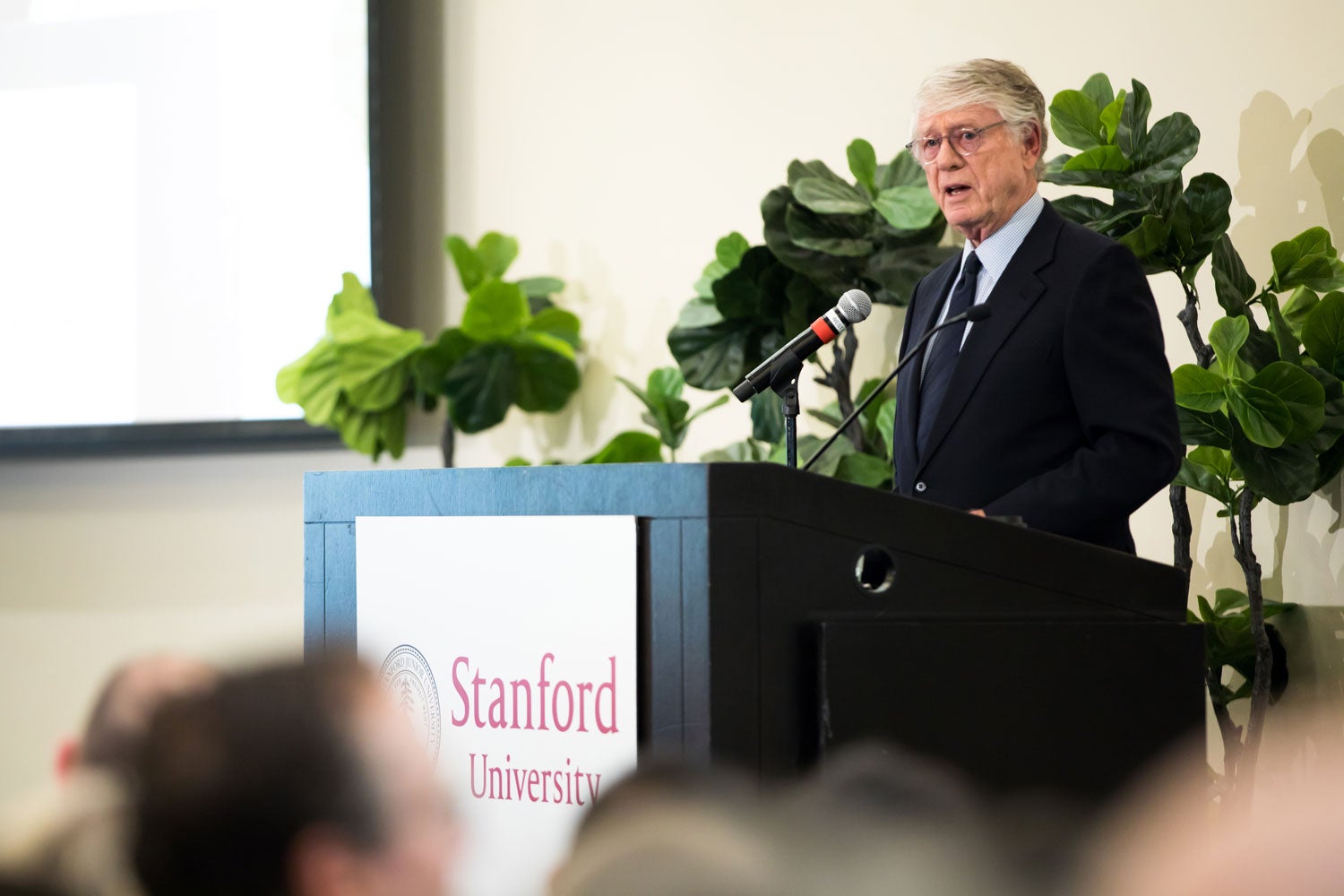Ted Koppel delivers a brief history of fake news to the Stanford community
Journalist and Stanford alum Ted Koppel talks about how the democratization of media has undermined the freedom of the press and democracy itself.
Some call it fake news and alternative facts. Others claim it’s disinformation. A few might say it’s post-truth politics where objective facts are obscured by subjective opinion.

“Tens of millions of Americans have had their confidence in the concepts of objective reality, indisputable facts and good journalism undermined. Perhaps, irretrievably,” said Ted Koppel at Stanford University. (Image credit: Holly Hernandez)
To acclaimed journalist Ted Koppel, former anchor for ABC’s Nightline, a Stanford ’62 alum and the 2018 Mimi and Peter E. Haas Distinguished Visitor at Stanford, it’s eroding American values and the freedom of the press.
“It is entirely appropriate that we recognize and label those efforts as corrosive to the very foundations of a vibrant democracy,” said Koppel, before a packed auditorium at Stanford Wednesday.
In his talk A Brief History of News: Fake, the Other Kind and Where We Go from Here, Koppel described how the journalistic process is being undermined by the democratization of the media.
“The democratization of media, the accessibility of the internet to so many who lack any journalistic training – any discipline whatsoever – suggests a loosening of standards that must inevitably infect journalism overall,” said Koppel, adding that greater discipline from journalists is needed now more than ever.
How did we get here?
Koppel described how the 1987 abolition of the fairness doctrine – a policy that required licensed broadcasters to present controversial issues in an “honest, equitable and balanced” way – allowed for opinion to be normalized into the news cycle. Under the auspices of free speech, partisan and bombastic political commentators have been able to broadcast nationally, Koppel said. In addition, networks framing news by political affiliations have also emerged.
Meanwhile, market pressures increased, newsrooms shrank and a 24-hour news cycle emerged. As news came faster, the speed to deliver information mattered more than fact-checking its accuracy.
Disrupting traditional news media further was the public expansion of the internet in 1991. For the first time in recorded history, millions of people had direct to access to a tool for mass communication, said Koppel.
Fast forward to the news cycle today.
“Traditional news organizations are struggling in mounting skepticism to maintain discipline and objectivity while an army of undisciplined and wholly subjective amateurs undermines the very notion of freedom of the press,” said Koppel, noting that the fragmentation of media along narrow, ideological lines has created opinion silos with radically different worldviews.
“We have become highly selective in our approach to facts,” he said, warning that people are predisposed to favor facts that confirm existing biases. It is the sorting of Americans by partisan beliefs that troubles Koppel the most.
Democracy needs good, fact-based journalism, Koppel said. An informed electorate depends on professional reporters working with committed editors, producers and fact checkers to keep them accurately aware about issues important to their lives, he said. Koppel also called for more humility as a step toward bridging partisan divides.
Koppel’s residency at Stanford
Koppel’s lecture was one of several engagements between Koppel and the Stanford community.
“We have been fortunate to have Ted Koppel, a truly legendary journalist, in residence at Stanford at a time when our nation and world are grappling with essential questions about the interplay between democracy, journalism and punditry, and technologies that are fundamentally transforming how we understand world events and relate to each other as people,” said Tom Schnaubelt, executive director of the Haas Center for Public Service.
As part of his residency as the Mimi and Peter E. Haas Distinguished Visitor, Koppel delivered several talks open to the public, including participating in a Cardinal Conversations event; a town hall meeting about civic engagement; and a discussion on how to lead a meaningful life with Jane Shaw, dean for religious life and a professor of religious studies in the Stanford School of Humanities and Sciences.
During his conversation with Shaw, Koppel emphasized the need for fact-based journalism.
“I like to draw the analogy between good journalism and good cartography,” Koppel said to Shaw. “A good map takes you unerringly from point A to point B even though it is a very simple representation of a much larger and more complex reality. Good journalism does the same thing. A good journalist can cover a speech or an event or a crisis and do it in such a way that if he is a print journalist or if she is a broadcast journalist, they can do it in a really tiny representation of the actual event but in such a fashion that you are left with the correct impression.”
The Mimi and Peter E. Haas Distinguished Visitor Program provides an opportunity for students and faculty to connect with prominent individuals whose lives and careers have had significant public impact.
“In his time here, Ted has inspired students and other members of the Stanford community to think in new ways about the role of integrity and balanced analysis, not just in journalism, but in leadership. He has also reaffirmed the fundamental importance of public service as a cornerstone of community life on campus and in the United States,” said Schnaubelt.
Previous distinguished visitors have included Beverly Daniel Tatum, president emerita of Spelman College; Rick Lowe, Houston artist and a 2014 MacArthur Foundation grant recipient; John Githongo, Kenyan journalist and renowned anticorruption activist; Gro Harlem Brundtland, former prime minister of Norway; Jane Lubchenco, former head of the National Oceanic and Atmospheric Administration; and Russ Feingold, former U.S. senator.
